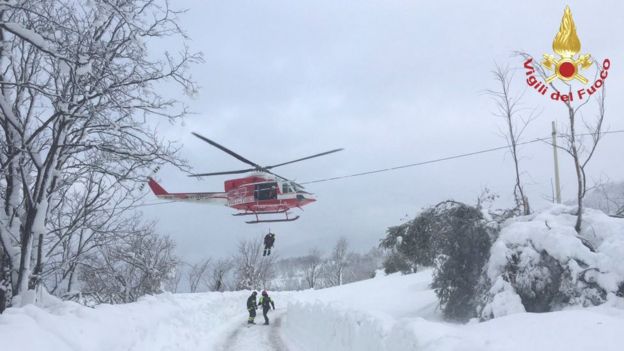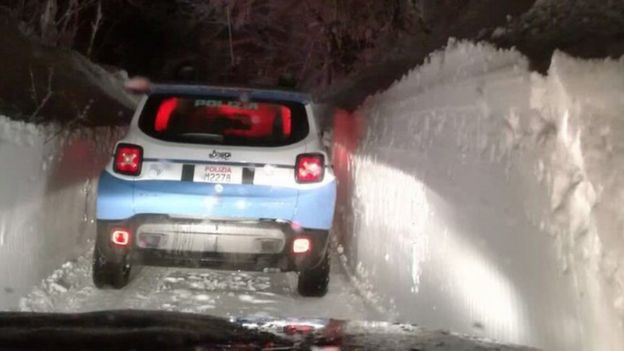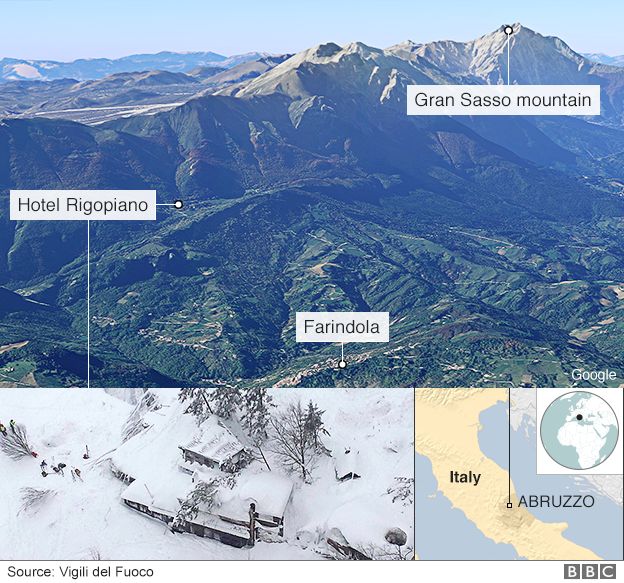Italy avalanche: ‘Many missing’ in Rigopiano hotel in Abruzzo
BBC
Rescuers say up to 30 people are missing after a hotel in central Italy was hit by an avalanche, apparently triggered by an earthquake.
Rescuers battled overnight to reach the Rigopiano hotel, with the first of them arriving on skis. Snow dislodged by the avalanche had blocked the roads in.
One person has been pulled dead from the snow. Two have been found alive but most others appear to be still buried.
One official said there were “many dead” in the hotel.
The mountainous region of Central Italy was hit by a succession of four earthquakes on Wednesday and further tremors were reported overnight.
The quakes have compounded problems resulting from recent storms, which have brought down power lines and cut off villages.
Rescue operations are under way in other parts of the region as well.
What happened?
The roof on the four-star spa hotel, close to the Gran Sasso mountain in the Abruzzo region, partly collapsed on Wednesday night. Rescuers said at least 20 tourists and seven staff were inside at the time.
Crews had been calling out to survivors but there was no response.
Local residents in Farindola alerted emergency services.
The first victim, a man, was pulled out at about 09:30 (08:30 GMT) on Thursday, Corriere della Sera newspaper reported.
“There are many deaths,” Antonio Crocetta, the head of a mountain rescue team, was quoted as saying.
There were children among the guests, and media reports say children are among the dead.
Italian media reported that some guests at the hotel had been able to send text messages after they were trapped.
 VIGILI DEL FUOCO/TWITTER – Rescuers have struggled to reach the hotel
VIGILI DEL FUOCO/TWITTER – Rescuers have struggled to reach the hotel POLIZIA DI STATO
POLIZIA DI STATO_
“Help, we’re dying of cold,” Ansa quoted one couple as saying.
A snowstorm and blocked routes made access to the hotel difficult. Vehicles struggled to get through the snow, and some rescuers eventually resorted to skis.
Italian media said the first rescuers only reached the hotel on skis at 04:00 on Thursday.
Video footage showed them shovelling through a wall of snow.
Two people were found alive outside the damaged building, which was surrounded by fallen trees. They were taken to hospital, one suffering from hypothermia.
One of them, Giampaolo Parete, said he had gone to get something from his car when the avalanche hit.
“I was covered by the snow but I managed to get out. The car was not submerged and I waited for the rescuers to arrive,” he said, quoted by Ansa news agency.
He added that his wife and two children were under the rubble.
The civil protection agency said it was now trying to get rescue vehicles to the hotel. There are reports that there is an ambulance a few kilometres away, which cannot yet reach the building.
How did this come about?
Wednesday’s quakes came after the regions of Abruzzo, Marche and Lazio were hit by days of heavy snow.

One person in the area died on Wednesday and another was reported missing.
The same region was hit by an earthquake on 24 August, when 298 people died.
Another earthquake in October killed no-one, as most of the population centres had been evacuated.
Since then, the region has been hit by cold weather and snowstorms.
Why are so many quakes hitting Italy? By Jonathan Amos, BBC science correspondent
The Apennines region saw three Magnitude-6 tremors between August and October. One of the four latest earthquakes was 5.7.
Many Apennines residents will of course be asking why there have been so many large quakes in so short a time frame. But this is often how the geology works.
The big picture is reasonably well understood. Wider tectonic forces in the Earth’s crust have led to the Apennines being pulled apart at a rate of roughly 3mm per year – about a 10th of the speed at which your fingernails grow.
But this stress is then spread across a multitude of different faults that cut through the mountains. And this network is fiendishly complicated.
It does now look as though August’s event broke two neighbouring faults, starting on one known as the Laga and then jumping across to one called the Vettore.
___
http://www.bbc.com/news/world-europe-38674788
